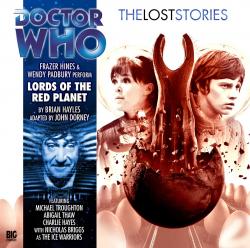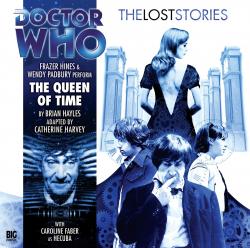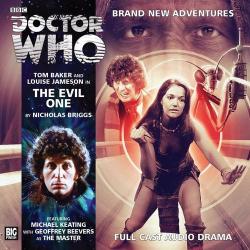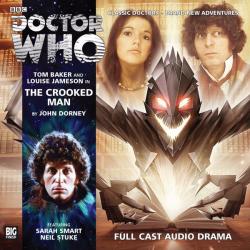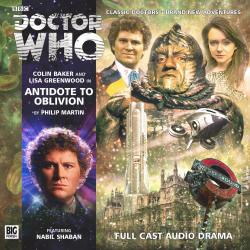The Last Of The Colophon (Big Finish)
Friday, 26 September 2014 - Reviewed by

Last Of The Colophon
Written by Jonathan Morris
Directed by Nicholas Briggs
Released: May 2014 by Big Finish
On yet another attempt to go for a holiday, they exit the TARDIS, finding nothing but a dry empty landscape, with rather “bracing” temperatures. This, in short, summarises the opening 5 or so minutes of the Last of the Colophon, the fifth episode of season 3 of the Fourth Doctor Adventures range.
Subsequently, a man, identified as Morax, is awoken by a computerised voice, relating the Doctor and Leela’s arrival. Morax also learns of the presence of the orbiting ship, which he orders to be kept under observation.
Leela and the Doctor, after seeing a vapour trail from the planet’s surface, resolve to go and meet the crew of the spaceship, the Time Lord remarking that they could give them a “guided tour” of the desolate ruin that was once a city. The comedic aspects of the Doctor’s character, as well as Leela’s seemingly constant sense of unease, allow for some rather humorous moments here, as well as allowing the occupants of the ship, now seen clearly as a survey vessel, to be introduced.
We meet a robotic nurse by the name of Torvik, seemingly intent on keeping Morax imprisoned while life-forms arrive and leave outside. However, he is not as powerless as he appears, up to now breathing through a respirator and moving via the aid of a wheelchair. He removes the citadels shielding and activates the distress signal, which the survey team manage to pick up, angering the sadistic Nurse Torvik in the process.
The survey team, along with the two Time travellers, are allowed entry to the Citadel by Morax, who is now shown to be far more resourceful than when we first encountered him. Asteroth Morax states that he was a scientist and is the eponymous “last of the Colophon”. Horribly disfigured, with his legs in a state of atrophy, kept in a “half-life for centuries”. This “persuasive case” convinces the Doctor to help, working with deputy surveyor Sutton of the Oligarch.
The story then takes a chilling turn, giving rise to a sequence that is not unlike something from a modern first-person shooter. Ending the first episode on a rather retro-inspired cliff-hanger, with his companion’s life in the balance the doctor must choose wisely if they are to survive.
The second episode does contain some clever writing, with the doctor’s objections to the many misrepresentations of his sonic screwdriver definitely being worthy of note. The familiar sequences of running through corridors are also present. The plotline of the second episode, whilst also being as gripping as the first, seems at first glance to be shorter and rather rushed. But for those readers/listeners in fear of having overpaid for an adventure, things only get more interesting. A few plot threads that were unresolved and unanswered come into their own, with the ending being a very satisfactory conclusion
The writing in this episode is well suited to the era, along with the score, whose suspenseful notes and background presence make the important moments stand out and the chilling ones attain a dark tone. The genius and madness of the villain of the piece is rather similar to that of Davros, although said antagonist does show signs of restraint when faced with a situation that requires cooperation from hostages.
This episode draws parallels to the very first episode of The Sirens of Time, featuring a wheelchair bound prisoner held on a planet that isn’t quite what it seems.
The casting compliments the clever and humorous writing well, with every character having their own comedic lines and moments in equal measure.
To conclude, this story is somewhat of a rollercoaster ride, with twists and turns that you wouldn’t really expect. Additionally, a notable point of this drama is that not only does it feel very authentic to the fourth doctor era, but it also feels longer than previous stories in the range. Whether that is because of the intricately crafted plot, or just the fact that the story is one that draws you in, it is difficult to tell. I would urge anyone who is a fan of the suspenseful classic era of Doctor Who to give this one a look as well as anyone who just wants a good story to listen to.
